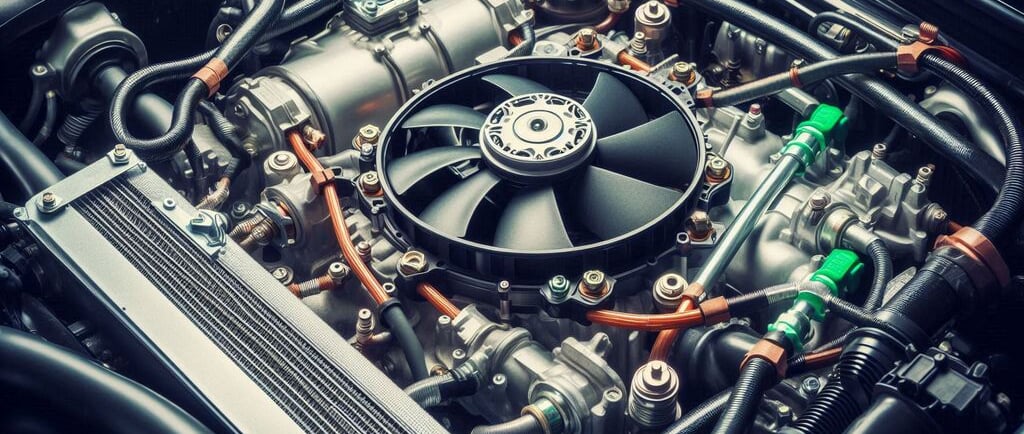Cooling Fan: Helps cool the radiator and engine.
Engines generate a lot of heat, especially during long drives, warm weather, or heavy loads. This is where the cooling fan steps in.
COOLING SYSTEMS
11/11/20244 min read


The Role of the Cooling Fan: Keeping Your Engine and Radiator Cool
Engines generate a lot of heat, especially during long drives, warm weather, or heavy loads. This is where the cooling fan steps in. This essential component helps cool the radiator and engine, ensuring your vehicle runs smoothly and safely. In this article, we’ll explore how the cooling fan works, why it’s essential, how to spot issues, and tips to keep it in peak condition.
What is a Cooling Fan, and How Does it Work?
The cooling fan, also known as the radiator fan, is located near the radiator and serves the primary purpose of drawing air through the radiator to help cool the engine. This fan turns on automatically when the engine temperature rises above a certain level and assists in lowering that heat quickly, especially during slow-moving or idle situations when there’s little natural airflow.
How the Cooling Fan Works
Automatic Activation: When the engine reaches a particular temperature, the fan kicks in, drawing cooler air over the radiator to regulate the engine’s temperature.
Continuous Cooling: The fan operates as needed to maintain optimal engine temperature, switching off once the engine cools down to a safe level.
Cooling fans can be electric or mechanical. Electric fans are more common in modern cars and operate independently of the engine speed, while mechanical fans are belt-driven and operate based on engine RPM.
Why is the Cooling Fan Important?
The cooling fan plays a crucial role in engine efficiency and overall vehicle performance. Here are some of the main reasons why the cooling fan is essential for your vehicle:
1. Prevents Engine Overheating
The cooling fan assists the radiator in regulating engine temperature. Without the cooling fan, your engine is more likely to overheat, especially in stop-and-go traffic or extreme weather conditions.
2. Improves Engine Performance
By maintaining a stable temperature, the cooling fan helps the engine operate at its most efficient. Consistent cooling allows for optimal combustion, which leads to better performance and fuel efficiency.
3. Prolongs Engine Life
Excessive heat is one of the leading causes of engine wear and damage. A well-functioning cooling fan keeps temperatures in check, helping to protect the engine’s components and prolong its lifespan.
Signs of a Failing Cooling Fan
A faulty cooling fan can cause your engine to overheat, leading to potential damage. Here are some warning signs to look out for:
1. Engine Overheating
The most obvious sign of a failing cooling fan is engine overheating. If you notice your temperature gauge rising beyond the normal range, especially in traffic or idle situations, your cooling fan might be the issue.
2. Fan Not Turning On
If the fan doesn’t engage when the engine temperature rises, it could be due to a faulty fan motor, a broken relay, or wiring issues. This is something that should be inspected by a mechanic immediately.
3. Loud Noises Coming from the Fan
A malfunctioning cooling fan may produce grinding or clicking sounds. This could indicate a problem with the fan blades, motor, or other internal components, and should be addressed as soon as possible to avoid further damage.
4. Reduced Air Conditioning Performance
When the cooling fan fails, you might also notice that your air conditioning system doesn’t perform as well, especially in hot weather. The cooling fan helps the A/C condenser remain cool, so if the fan isn’t working properly, your A/C might struggle.
Common Causes of Cooling Fan Issues
Several factors can cause cooling fan issues, including:
Faulty Fan Motor: The motor powers the fan blades, and when it fails, the fan can’t operate.
Electrical Problems: Issues with wiring or relays can disrupt the power supply to the fan, preventing it from turning on.
Broken Fan Blades: Fan blades can become damaged or unbalanced, which may cause loud noises or reduced cooling performance.
Worn Bearings: Bearings inside the fan can wear out over time, resulting in a noisy fan and reduced efficiency.
Understanding these causes can help with diagnosing and preventing cooling fan issues before they turn into costly repairs.
Cooling Fan Maintenance Tips
Regular maintenance can help keep your cooling fan in great condition and extend the life of your engine. Here are some maintenance tips to ensure it continues running smoothly:
1. Inspect the Cooling System Regularly
Regularly check the fan, radiator, and surrounding areas for debris, leaks, or signs of damage. Dirt and debris can obstruct airflow and affect the fan’s ability to cool efficiently.
2. Check Coolant Levels
Low coolant levels can cause the engine to overheat, even if the fan is working. Check your coolant levels periodically and refill if necessary, following the manufacturer’s recommendations.
3. Listen for Unusual Sounds
Listen for any strange noises from the cooling fan when the engine is running. Grinding, squealing, or clicking sounds often indicate worn-out components or a damaged fan blade that needs repair.
4. Service the Fan Motor
The fan motor can wear out over time, particularly in electric fans. Regular inspections by a mechanic can ensure it’s in good condition and replace it if necessary.
DIY Cooling Fan Troubleshooting
If you suspect an issue with your cooling fan, here are some simple steps to troubleshoot it yourself:
Check for Obstructions: Look for any debris or objects blocking the fan blades.
Test the Fan Motor: If the fan isn’t turning on, try testing the motor. Consult your vehicle’s manual for instructions, or have a mechanic perform the test.
Inspect Fuses and Relays: Check your car’s fuses and relays for signs of damage. A blown fuse or faulty relay can prevent the fan from working.
Conclusion
The cooling fan is essential in keeping your engine and radiator cool, preventing overheating, and improving overall engine performance. Recognizing the signs of a failing cooling fan, such as engine overheating or unusual noises, can help you address issues early and avoid costly repairs. Regular maintenance, including inspecting coolant levels and listening for strange sounds, can keep your cooling fan and engine running smoothly.
Key Takeaways:
The cooling fan helps cool the radiator and engine, preventing overheating.
Common signs of a faulty fan include overheating, unusual noises, and reduced A/C performance.
Regular maintenance and early troubleshooting can keep your cooling fan in top condition.
For more insights, check out our articles on [Cooling System Maintenance Tips] and [Common Causes of Engine Overheating] for more ways to keep your vehicle in optimal shape. If you found this article helpful, feel free to leave a comment or share your experiences with maintaining your cooling fan.


